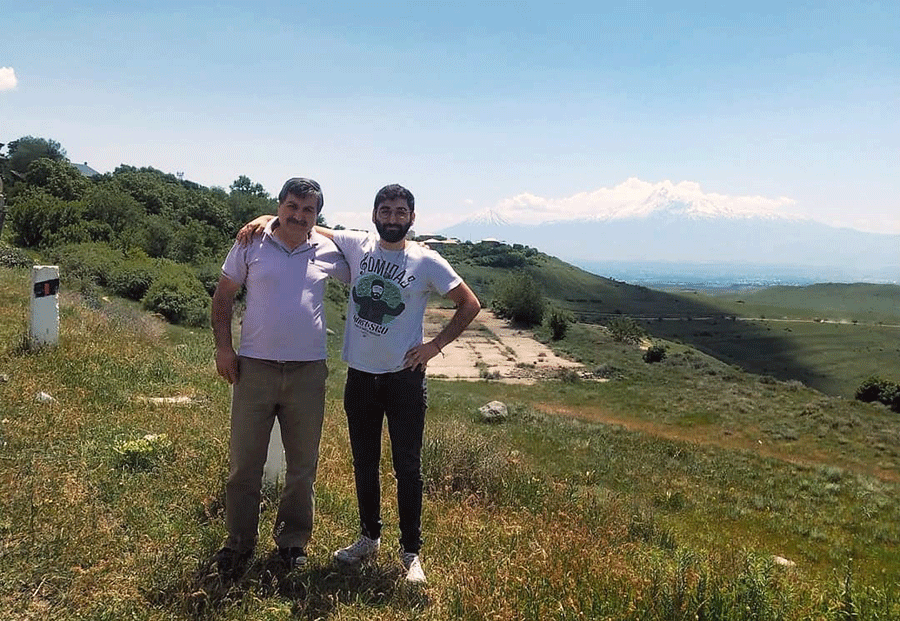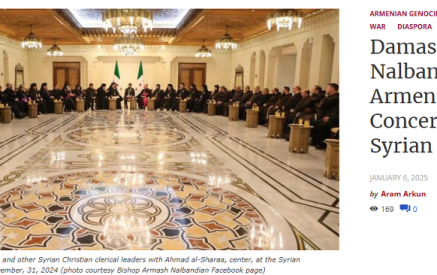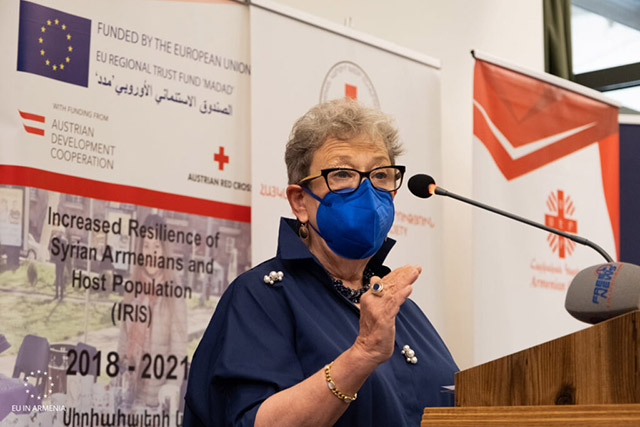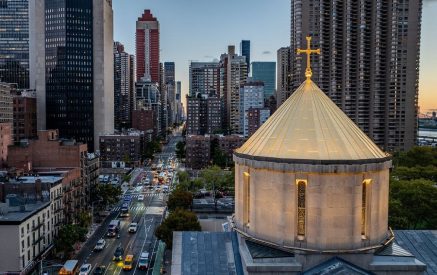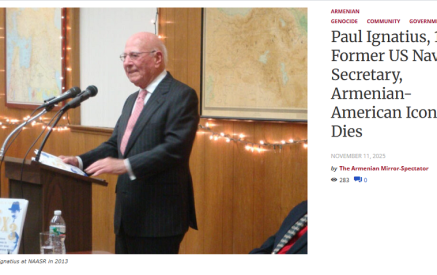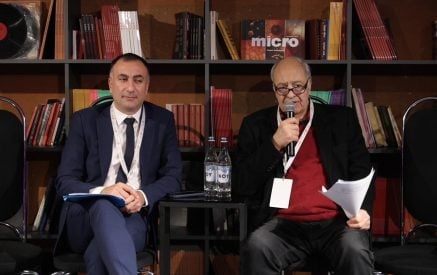by Krikor Sahagian
Like so many Armenians who moved from Syria to Armenia, Hagop was a millionaire before destiny decided that he would cut men’s hair for a living in the suburbs of Yerevan. Before the war, he had never been to Armenia. Life in the Levant on the shores of the Mediterranean was too good, and a $300 plane ride to the homeland seemed like an unnecessary expense. However, as is axiomatic of life, misfortune eventually struck, and an ironic, cruel world forced Hagop to make his one-way journey to Armenia. He arrived not as a millionaire, but as a poor man who would perhaps forever be despondent as he reminisced about his glorious past.
Yet Hagop, like many Syrian Armenians, was remarkably resilient. Although Armenia, the homeland, was still foreign to him, at 40 years old he did what he could to survive. He quickly relearned an old skill of cutting men’s hair. After mastering a few types of haircuts, he opened a modest barber shop in one of the many narrow allies of the city. He wasn’t particularly skilled, but he knew enough to lure in older men who couldn’t care less about what type of haircut they got. For some locals, Hagop’s broken Eastern Armenian was all they needed to hear to trust him. For them, Hagop was from abroad; hence, he was dependable. One of our nation’s enduring defects is trusting in everything that is from abroad.
Read also
When some clients would ask Hagop about his experience, he would falsely claim that he used to own a four-chair women’s salon before moving to Armenia. Impressed by this piece of information, the client would sit somewhere in the shop and Hagop, by winning over another naive customer, would move one step closer to regaining his millionaire status. To quell all doubts among his new customers, he would often employ superfluous theatrics when cutting hair. He would pretend to do impressive tricks with his scissors or act annoyed by how much the customer is moving his head. Without exception, while completing the final touches of the six-minute haircut, he would put some sort of gel on the freshly-cut head of hair and proceed to tell the customer that they wouldn’t find this gel anywhere in Armenia. It’s imported from abroad – where everything is apparently better.
Recently, when my father visited Armenia for a few weeks, he wanted to get a haircut. Back in Jerusalem, my poor mother could never convince him to preemptively get one before his hair got embarrassingly messy. My father would delay this affair for as long as he could. I assume it was because my dad didn’t feel like he had anything to prove to anyone. In his mind, he had built a decent life for himself and his family – which is difficult to achieve among those who are hell bent on making it without surrendering any of their principles. Most importantly, my dad had married the most beautiful Armenian woman in the entire Middle East. Thus, to my mom’s discontent, my father never cared about how he looked. Physically, he only tended to his iconic mustache that had become an indivisible part of his identity.
However, there was a second, simpler reason why my dad delayed his visit to the barbershop. Jerusalem did not have an Armenian barber. At the barbershop, he was forced to speak in Arabic or Hebrew about things that were hardly near and dear to his heart. For the simpleminded like myself and many others, hearing local gossip at the barber is always interesting. While my dad would engage in these conversations, deep down he did not care. Instead, with his broken Arabic and great difficulty, he would always try to shift the conversation to Armenia. As a child, I would sometimes go with him, and I would hear my dad speak about our small homeland and about how he was eventually going to sell everything and move there to a tiny village overlooking Ararat with his consumerist wife and his four spoiled sons. The poor Palestinian barbers, deprived of freedom and the ability to travel, would never find out for themselves about how much my dad exaggerated the beauty of Armenia.
For 63 years, my dad went to a barber and spoke to them in a foreign tongue about everywhere but home. This recently changed, however, when my dad and Hagop the barber crossed paths. My dad has been to Armenia more than a dozen times, but work and the hustle and bustle of life would only allow him to visit for a maximum of 10 days at a time. He had never visited a barber in Yerevan – until his last visit, when my mom told him calmly and affectionately that he would not be welcome back unless he got a haircut during his trip.
I accompanied my dad during this visit. We entered Hagop’s shop without much fanfare. Initially, we did not realize that my dad had never been to an Armenian barber – until my dad sat on the chair and Hagop asked him in Armenian how he wanted his hair cut. Back in the Middle East, the answer was simple: tarteeb, meaning “to put into order.” Usually, he did not go into further detail when speaking in Arabic, because it required too much mental effort to dig deep and find the right words.
However, when he was asked the question this time, for a split second my dad froze and realized that he had never answered this question in Armenian. He cracked his characteristic cynical smile and told Hagop that this was the first time he was visiting a barber with whom he could speak Armenian – not just Armenian, but Western Armenian. Hagop did not get the novelty of it. I assume he did not believe my dad either, because coming from the large Armenian community of Aleppo, he could not understand how the Armenian community in Jerusalem did not have a single local Armenian barber.
Throughout the haircut, the two bonded. Naturally, politics flooded the conversation between the two men, who for decades had felt the turmoil and turbulence of the region on their skin. They laughed as they spared no political leader both in the Middle East, Armenia, or even the world. Every politician was either a criminal, a crook, a thief or simply an idiot. As a person who is yet to give up on my naive idealism, I am often shocked to discover how pessimistic older people, who have seen so much, could be towards a world that despite its many flaws is still so beautiful to me. Hagop lamented the fact that he, as a Syrian national, could never make his pilgrimage to Jerusalem to reaffirm his Christian faith, which, based on my modest observations, did not seem very visible to begin with. My father similarly bemoaned the fact that he could not visit Syria. He would have loved to eat the exquisite cuisine the country was so famous for and admire all the things that the Armenian community had built in one of the great metropolises of the world.
The haircut ended way before the conversation did. My dad and Hagop were quite different and did not agree on almost anything. Yet for the first time ever, I felt like my dad was trying to draw out his visit to the barber. He had years and decades worth of conversation that had been built up inside him that could only be released while visiting a barber who could speak Armenian and feel the subtle nuances of tone and meaning in his voice. My dad was elated. At 63, he had finally experienced a haircut at an Armenian barbershop.
The haircut was so good, that my mom approved of it quite quickly. As he left the shop, my dad told Hagop how great his visit to the homeland had been this time. Hagop expressed his cordial farewells to my dad, surely thinking that he is just another naive Diasporan Armenian, who wouldn’t speak so highly of Armenia had he lived here.


















































